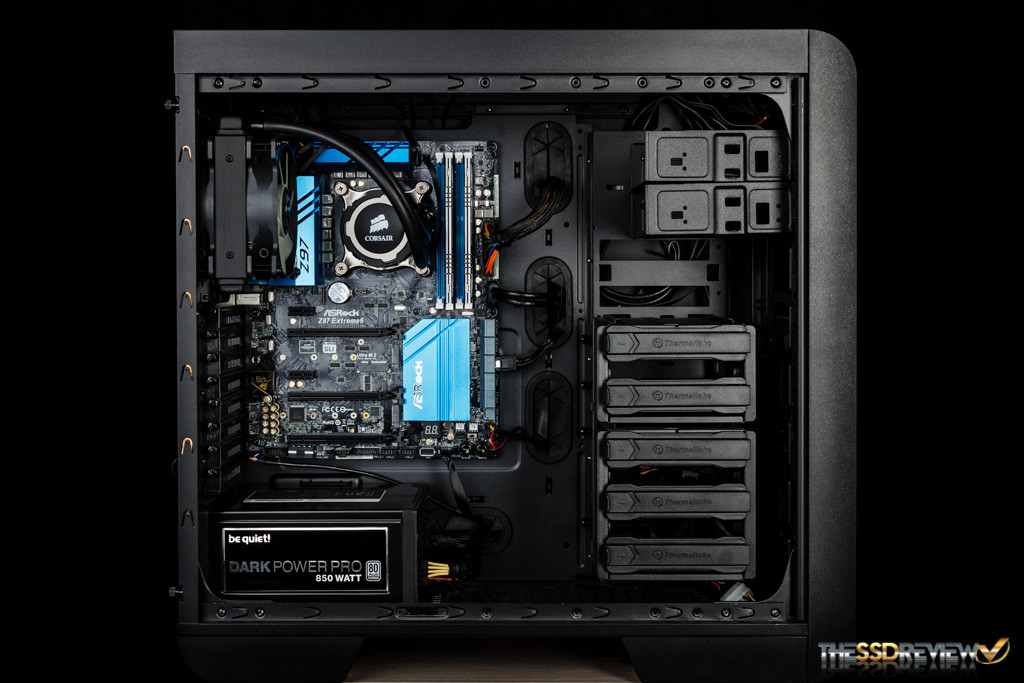TSSDR TEST BENCH AND PROTOCOL
SSD testing at TSSDR differs slightly, depending on whether we are looking at consumer or enterprise SSDs. For consumer SSDs, our goal is to test in a system that has been optimized with our SSD Optimization Guide. To see the best performance possible, the CPU C states have been disabled, C1E support has been disabled, Enhanced Intel SpeedStep Technology (EIST) has been disabled. Benchmarks for consumer testing are also benchmarks with a fresh drive so, not only can we verify that manufacturer specifications are in line but also, so the consumer can replicate our tests to confirm that they have an SSD that is top-notch. We even provide links to most of the benchmarks used in the report.
SYSTEM COMPONENTS
This Test Bench build was the result of some great relationships and purchase; our appreciation goes to those who jumped in specifically to help the cause. Key contributors to this build are our friends at ASRock for the motherboard and CPU and be quiet! for the PSU and cooling fans. Also, a big thank you to Thermaltake for the case and Kingston for the RAM. We have detailed all components in the table below and they are all linked should you wish to make a duplicate of our system as so many seem to do, or check out the price of any single component. As always, we appreciate your support in any purchase through our links!
| PC CHASSIS: | Thermaltake Core V51 |
| MOTHERBOARD: | ASRock Z97 Extreme6 |
| CPU: | Intel Core i5-4670K |
| CPU COOLER: | Corsair H75 |
| POWER SUPPLY: | be quiet! Dark Power Pro 10 850W |
| SYSTEM COOLING: | be quiet! Silent Wings 2 |
| MEMORY: | Kingston HyperX Beast 2400Mhz |
| STORAGE: | Samsung 850 Pro |
| IRST DRIVER: | 14.8.1.1042 |
BENCHMARK SOFTWARE
The software in use for today’s analysis is typical of many of our reviews and consists of Crystal Disk Info, TRIMcheck, ATTO Disk Benchmark, Crystal Disk Mark, AS SSD, Anvil’s Storage Utilities, PCMark Vantage, and PCMark 8. We prefer to test with easily accessible software that the consumer can obtain, and in many cases, we even provide links. Our selection of software allows each to build on the last and to provide validation to results already obtained.
Crystal Disk Info is a great tool for displaying the characteristics and health of storage devices. It displays everything from temperatures, to the number of hours the device has been powered, and even to the extent of informing you of the firmware of the device.
In Crystal Disk Info, we can see there are not a whole lot of attributes, but there are still a lot of handy ones to monitor your drive with. Total host writes, power on count and hours are all good to have. There is a working temperature sensor. The program shows that NCQ, TRIM, and DevSleep are supported. The firmware revision we are testing with today is SBFZ10.1.
We’ve covered TRIMcheck in the past. It is a great tool that easily lets us see if TRIM is actually functioning on a SSD volume in your system.
As can be seen in the screenshot above, TRIM is indeed working.
ATTO Disk Benchmark is perhaps one of the oldest benchmarks going and is definitely the main staple for manufacturer performance specifications. ATTO uses RAW or compressible data and, for our benchmarks, we use a set length of 256mb and test both the read and write performance of various transfer sizes ranging from 0.5 to 8192kb. Manufacturers prefer this method of testing as it deals with raw (compressible) data rather than random (includes incompressible data) which, although more realistic, results in lower performance results.
120GB
240GB
ATTO shows us results that are in line with what we were expecting based on the specifications for the drives. Sequential read reached over 560MB/s and write over 545MB/s. Overall, the speeds produced as the file size increased are very good and there are no oddities to point out so far. Let’s move on to some of our other tests to see how it does there.
 The SSD Review The Worlds Dedicated SSD Education and Review Resource |
The SSD Review The Worlds Dedicated SSD Education and Review Resource | 


thanks for your honest pros and cons review. instead of the buy it its cheap and better than a hd.
Hi Sean,
When I saw those 4K-QD1 Nos I thought can’t be TLC-Can’t be ram-less,oooooh.
(EDIT-Sean was it really as responsive as those Nos show?)
It’s getting almost impossible today to find a good/reasonable priced 120/128 GB
boot drive since the 120-850EVO went EOL.
Then we got to the real world tests, noooooooooooooooo.
It’s below the BX200-which deserves lemon status.
Then HD-Tune picked it………
CONCLUSION-IGNORE ALL SYNTHETIC TESTS WITH THESE DRIVES…………..
till page 3:
WOW high performance
starting with page 4:
WTF worse than and hdd
I got the 240 GB and it’s slow… Read speed doesn’t goes up from 420 Mbps and write from 110 Mbps… I have ACHI drivers and other little twerks, but still almost the same… Somebody please tell me if my disk it’s broken or something… The storage is fine and I tryed it on other pc, same results…
To see real write speeds in HD Tune, you can/should use Erase optionç I am always doing that. It has a Zero and random options and they are mostly incompressible as each write operation is performed block by block.